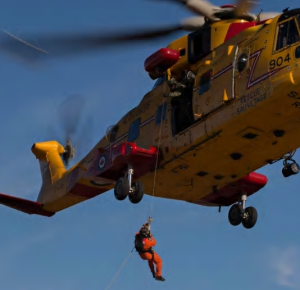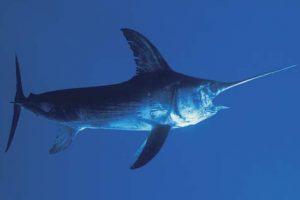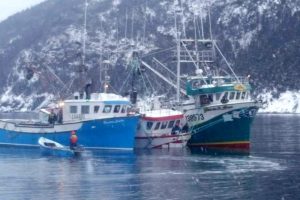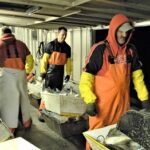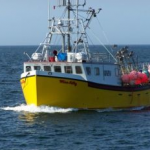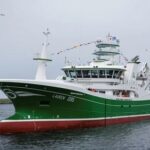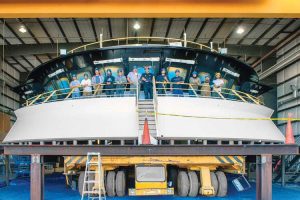Monthly Archives: June 2018
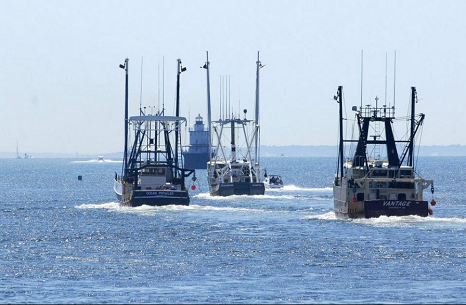
Don Cuddy: Late New Bedford scalloper never got the justice he deserved
It probably passed unnoticed by most people but an obituary for Larry Yacubian appeared in this newspaper on June 13. He died in Punta Gorda, Florida on May 18. But most fishermen still shake their heads when his names come up. I don’t know if he died a bitter man. I hope not, although he had every reason to feel that way after the treatment meted out to him by federal law enforcement. Larry was a New Bedford scalloper and boat owner. In December 1998 his boat, the Independence, was boarded by the Coast Guard while fishing offshore and he was accused of fishing in a closed area. What followed can only be described, euphemistically, as a miscarriage of Justice. The fines imposed on him by an administrative law judge working on behalf of NOAA were so excessive that he was forced to sell his boat, his permits and the Westport farm that had been in his wifes family for 350 years – all this to satisfy the greed of some bad actors who considered themselves above the law because they were carrying a badge. >click to read<20:06

Lets get every Rep. in the House to Co-Sponsor “American Fisheries Advisory Committee Act” S1322
Greetings from Gloucester! My name is Sam Parisi, and as some of you know, I have been concerned with the process of how S-K Funds, and distribution of the funds have been handled by NOAA.
I have asked our Senators to support Bill S1322 and I am happy to say thanks to Angela Sanfilppo, The Mayor of Gloucester, The Mass Lobster Association, the Gloucester Fisheries Commission and fisherman up and down the coast that have contacted Senator Markey who is on the committee, and is now with us in support of this important the bill, which will be going to the House.,, I ask all of you to contact your Congressmen and Senators in your area’s to tell them to vote in favor Senator Dan Sullivan’s bill, the “American Fisheries Advisory Committee Act”, S1322. >click to read<18:01
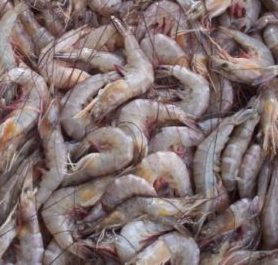
In the Gulf, Record breaking May reverses poor shrimp landings in first third of 2018 in the Gulf
16.2 million pounds of shrimp was landed in the Gulf of Mexico last month, the highest volume reported for the month since 2009. 3.6 million pounds of shrimp was landed in Texas, with another 1.5 million pounds of shrimp landed in Alabama. Both represent the highest amounts of shrimp landed in these states for the month of May since the Southern Shrimp Alliance began tracking this data in 2002. 10.4 million pounds of shrimp was landed in Louisiana last month, up from 7.9 million pounds in May of 2017 and 6.1 million pounds in May of 2016. In fact, landings in Louisiana last month were the highest for any May since 2013. >click to read<14:59
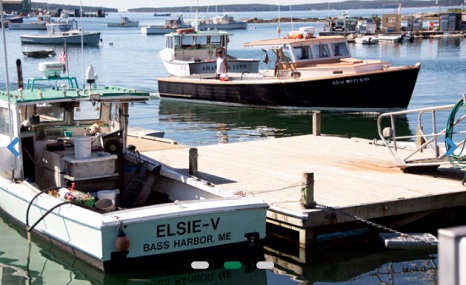
This competition might be the most Maine way to welcome in summer
If you are looking for something to race, few vehicles are less suited to the task than lobster boats. Squat, squarish, loaded with tons of equipment, lobster boats are essentially floating platforms, working craft from which lobster traps are hauled up or dropped off, often in lousy weather. Yet about 70 such boats are expected to race a mile course just outside Bass Harbor on Sunday as part of the 2018 Maine Lobster Boat Racing season. The races are free and open to the public, according to Wayne Rich, a lobsterman and organizer of the Bass Harbor Lobster Boat Race. >click to read<11:50
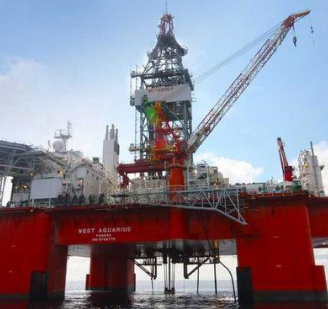
BP reports spill of drilling fluids in exploration operation off Nova Scotia
BP Canada has reported a spill of drilling fluids from its oil exploration operation taking place off the coast of Nova Scotia. An incident report on the Canada-Nova Scotia Offshore Petroleum Board website said there is a “preliminary estimate” that 136 cubic metres spilled from the West Aquarius drilling unit on Friday before it was stopped.The news release said an early investigation by the company indicates the spill occurred in piping about 30 metres below sea level. “Today marks only two months since BP started drilling, and already there has been a significant spill,”>click to read<10:52
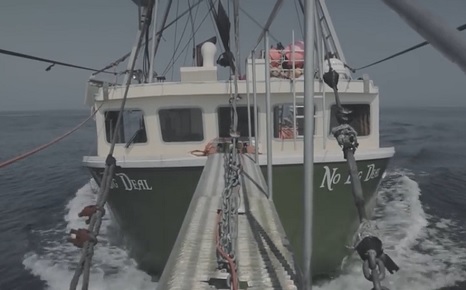
Mightier Than the Swordfish: Nova Scotia’s Harpoon Fishermen
A hundred miles off the coast of Nova Scotia, fishermen are in offseason mode. If it were wintertime, they’d be hauling lobster in closer to shore. But now, in July, they’re far from the familiar topography of Shag Harbor. They’re on the lookout for swordfish, and they’re using a deadly tool rarely seen in Western waters anymore: harpoons.,, He’s looking for one thing: a fin as it “nicks” the surface. The swordfish’s crescent-shaped dorsal fin is distinct from that of a sunfish or dolphin, but more easily confused with a shark’s. If the fin seems worth pursuing, the captain steps on the gas, and the harpooner prepares to “stick” the fish. Video, >click to read<09:04
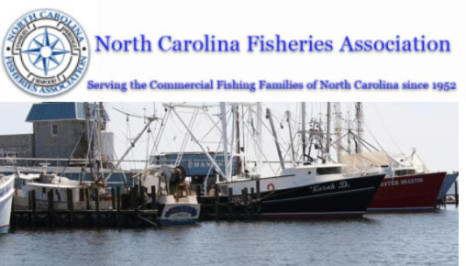
North Carolina Fisheries Association Weekly Update for June 22, 2018
>Click here to read the Weekly Update<, to read all the updates >Click here<, for older updates listed as NCFA <click here>08:23
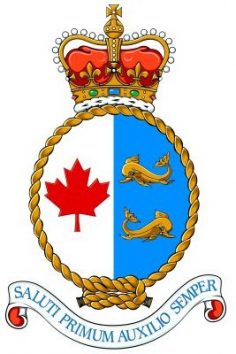
4 Fishermen rescued after abandoning burning fishing vessel off St. John’s
Four people have been safely rescued from a life-raft after abandoning their fishing vessel that caught fire off the coast of St. John’s Friday night. The crew members of the Challenger Traveler were brought to safety by the supply vessel Atlantic Raven, following a prompt rescue response that included two coast guard vessels, a helicopter and half a dozen fishing boats. Maj. Mark Morris, the officer in charge at the Joint Rescue Co-ordination Centre in Halifax, said a distress call came in around 8 p.m. while the boat was 160 kilometres off the coast of St. John’s. Shortly afterward, the crew were forced to abandon ship for the life-raft and were awaiting rescue for approximately two hours, said Morris. >click to read<07:52

Breaking: Coast Guard searching for 4 people in life-raft who abandoned fishing vessel off St. John’s
The coast guard is trying to find four people who abandoned their fishing vessel for a life-raft after issuing a distress call 160 kilometres off the coast of St. John’s on Friday night. A public affairs officer with the Joint Task Force Atlantic (JTFA) confirmed for CBC News that the position of the raft is known, but contact has not yet been established. The crew members were on board the Challenger Traveler, a 20-metre fishing vessel. JTFA would not immediately confirm what prompted the distress call. >click to read<22:12
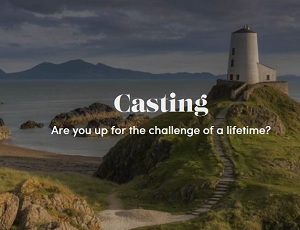
A Reality Show is Seeking Volunteers to Live Like An Early 20th Century Welsh Fisherman
A TV production company is currently seeking volunteers to live for a month in a cottage along the rugged coastline of North Wales. Sound like a dream? There is a catch: You’ll have to live and work as a fisherman…from 1906. For the show, the company will recreate a traditional fishing village from that time period, with participants wearing fisherman’s garb from the early 20th century and playing house in a simple fisherman’s cottage (something tells us this might not be as cute as it sounds?). Participants will also be earning a living from the sea. Participants will also be earning a living from the sea by fishing from traditional sailboats, collecting shellfish, foraging for seaweed and herbs, and selling their bounty to local fishmongers. >click to read< Casting Call, >click here<18:31
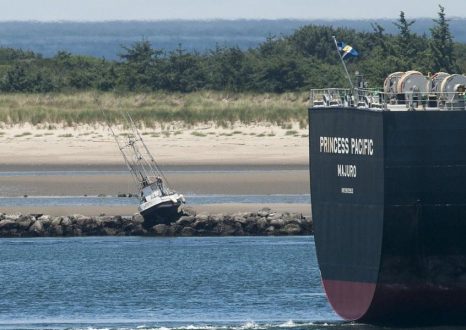
Coos Bay – Fishing Vessel runs aground after losing power
Around 5 a.m. Tuesday morning, a 28-foot commercial fishing vessel known as the lost power on its way out to sea and ran aground at low tide on the North Spit. After the vessel lost power it drifted into a rocky area of the North Spit known as the Cribs Jetty. The tide going out caused the vessel take significant hull damage and become stuck. “The vessel apparently lost power and drifted up onto the rocks where it became lodged on the Cribs Jetty. The tide went out and it wasn’t able to get off of the rocks,” commanding officer at Coast Guard Station Coos Bay Kary Moss said. >click to read<15:57
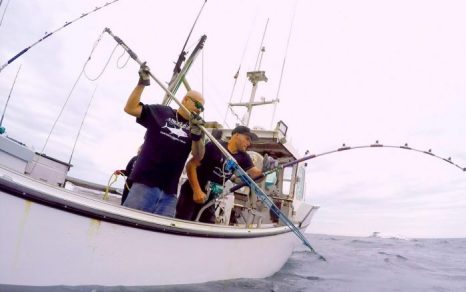
The Life of a Fisherman, On the Small Screen: Gloucester’s Famous TV Stars
America’s oldest seaport, Gloucester, Massachusetts is 31 miles north of Boston. Settled in 1623 as an English colony, its charter predates both those of Salem and Boston (1626 and 1630, respectively).,, The lore of Gloucester’s brine also includes a colony of commercial fishermen. Some of those seafarers are featured on National Geographic’s hit television series Wicked Tuna. New Boston Post caught up with Dave Marciano, captain of the Hard Merchandise, for some behind-the-scenes dish about the show, to discuss why the popular series launches from Gloucester, and most importantly to understand how the endangered bluefin tuna population is protected from over-fishing. >click to read< 15:00
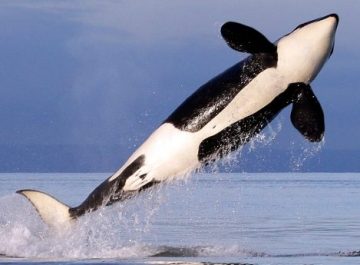
$1.5 billion Oceans Protection Plan – Canada takes immediate action to protect endangered whales
Today, Canada’s Whales Initiative was announced in Vancouver by the Honourable Marc Garneau, Minister of Transport, and Jonathan Wilkinson, Parliamentary Secretary to the Minister of Environment and Climate Change. This $167.4 million initiative under Budget 2018 will protect and support the recovery of the Southern Resident Killer Whale, the North Atlantic right whale, and the St. Lawrence Estuary beluga whale through comprehensive actions tailored to address the unique combinations of threats. >click to read<13:02
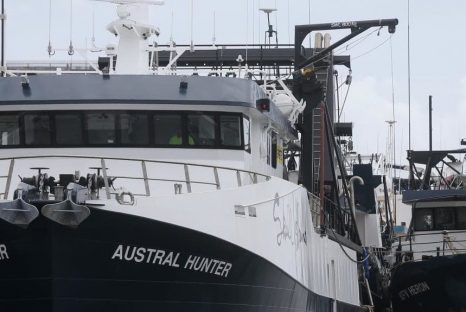
Charges Dropped – Fishing company to spend $970k following deckhand death
Ryan Donoghue was electrocuted while on board an Austral Fisheries Pty Ltd prawn trawler after a wave breached the deck while he was using an electric angle grinder. The grinder was plugged into an electrical socket that was not protected by a residual current device and NT WorkSafe charged the company over the death last year. But the workplace regulator has now dropped the charges after the company agreed to enter into a legally enforceable undertaking to spend the cash on health and safety upgrades and community contributions. >click to read<12:21

Trump Is Reorganizing The Federal Government And Interior Secretary Zinke Loves It
President Donald Trump signed an executive order Thursday to reorganize the federal government, a welcome move for Secretary of the Interior Ryan Zinke as he attempts to restructure the Department of the Interior (DOI). Trump’s order directs the Office of Management and Budget to suggest ways to consolidate the federal government, streamlining agencies and repositioning some under departments more closely aligned with each agency’s responsibilities, according to a White House statement. Zinke is currently making plans to reorganize his own department, but those plans have been complicated by agencies that he has no control over. For example, the National Marine Fisheries Service (NMFS) >click to read<11:31
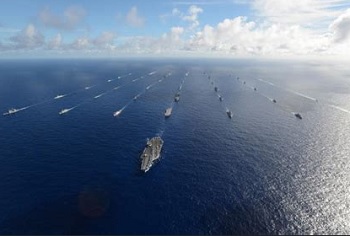
RIMPAC battle lines forming – “They bomb right where we fish,”
It’s the 26th exercise since RIMPAC began in 1971 and the third iteration of the Oceans4Peace Coalition, which works to turn the heads of the public and Legislature against the exercise. “We are committed to educating the public about the Navy’s war games and their impacts on the ocean and our islands,” organizer Gordon LaBedz told TGI before the meeting.,, Shyla Moon, Kauai adviser for the Western Pacific Fishery Management Council, said fishermen are concerned about the impacts to stocks during and after RIMPAC. “They bomb right where we fish,” she said. >click to read<09:51
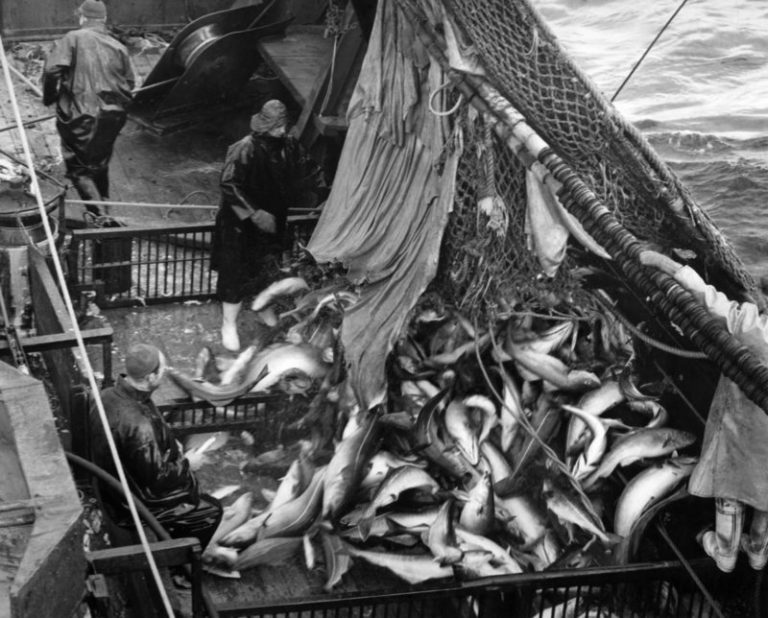
How Iceland Beat the British in the Four Cod Wars
In Icelandic, they were known as Þorskastríðin, “the cod strife,” or Landhelgisstríðin, “the wars for the territorial waters.” In English, they were simply “the Cod Wars.” Between the late 1940s and 1976, the two island nations of Iceland and the United Kingdom all but declared war—despite the fact that there were almost no casualties, and the former had no army. In the frigid waters between these two nations, four confrontations took place between Great Britain, a world superpower, and Iceland, a microstate of just a few hundred thousand people. Each time, Iceland won. And it all happened because of cod—and the right to fish it. These were the Cod Wars. >click to read<08:56
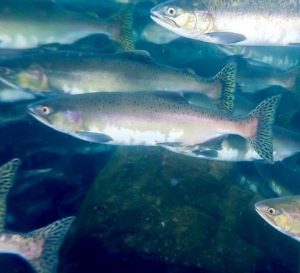
Years later, Alaska receives $56 million for salmon fishery disaster
Almost two years after Gov. Bill Walker requested federal funding to counterbalance a devastating blow to Alaska salmon, the government answered, to the tune of over $56 million in disaster relief money. As to who will actually be on the receiving end of that money, however, is not yet known. That disaster was the 2016 Southest Alaska Pink Salmon Fishery, which came under average of more than 4 million salmon, racking up losses of an estimated threshold of 35 to 80 percent.,,, The National Oceanic and Atmospheric Administration, which oversees the National Marine Fisheries Service, couldn’t immediately say who would be getting funds allocated. >click to read<08:25
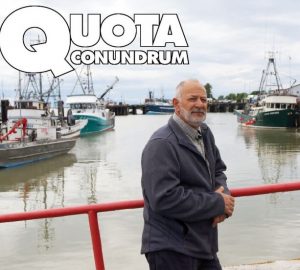
Offshore ‘slipper skippers’ and local monopolies target of new fishing industry study
If you have ever purchased fish at Fisherman’s Wharf, there’s a 50/50 chance the bulk of your money will make its way into the pockets of an investor, who may not even be able to pinpoint Steveston on a map. Such investors, both foreign and domestic, own government-issued quotas and licenses and lease them to fishers for a cut of the catch. Because profit margins for fishers are already razer thin, the extra costs of the quotas and licenses means young, new and independent fishers find it difficult to get a foothold in the industry. This regulatory system is being called into question by Fleetwood Port Kells Liberal MP Ken Hardie. Fishers have long complained about the ownership structure of licences and individual transferable quotas (ITQs), or catch shares,,>click to read< 20:08
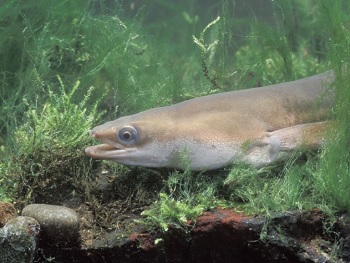
Cocaine in the Water Is Hurting River Eels
The Earth’s waters are laced with drugs—from prescription and over-the counter medications, to caffeine, to antibiotics from personal care products. Marine environments are also tainted with illegal drugs, and a recent study demonstrates just how harmful these illicit substances can be to aquatic wildlife. As Michael Marshall reports for New Scientist, researchers in Italy have found that small amounts of cocaine in water can make eels hyperactive and cause significant muscle damage. >click to read<16:41
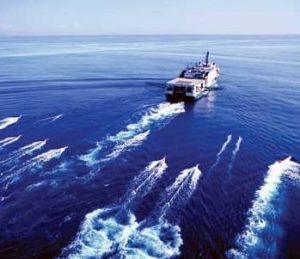
Dead plankton, stunned fish: the harms of man-made ocean noise
Human-caused ocean noise and its dangers to marine life are the focus of meetings at the United Nations this week, a victory for advocacy groups that have long warned of this problem. What are the causes of ocean noise? The main human activity that causes noise is maritime shipping. Among the loudest sounds are explosions aimed at demolishing offshore oil platforms, though these events are rare. Advocacy groups focus on seismic airguns, which are used by oil and gas interests to find reserves on the ocean floor. A boat tows 12-48 airguns at a time, each of which shoot loud blasts of compressed air. >click to read<15:27

Sam Parisi – Why I will be listening to other candidates in the next election.
Greetings to those that read this. As a retired fisherman, I have tried to help those who still exist. As a third generation fisherman and a Democrat, I have helped both Senator Warren and Congressman Seth Moulton of Massachusetts. I have written them twice and asked for their input and support for a Fish Bill. I am sad to say neither one have answered my letters. I have donated my time and money and put up campaign signs for them and yet can not get them to respond to me. I am disappointed,,,, >click to read<13:59
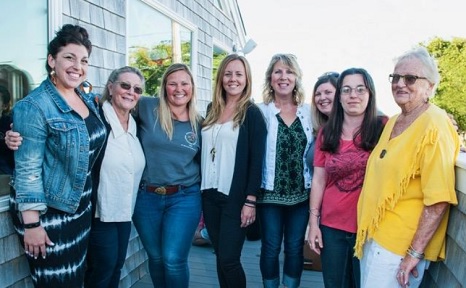
Provincetown: The women behind the fishermen
Fishing has changed, but being the wife of a fisherman has not. The wives keep the books, paint buoys, and make sure permits are up to date. They give pep talks, and sometimes fish alongside their husbands when a crewman doesn’t show up. These women are the shore captains, the homemakers, and the mates on and off the boats. They encourage, support and value their husbands and the work they do. “Fishermen’s wives also support each other,” says Tasia Rego, whose husband, Mike, fishes off the Miss Lilly. “We are like families. We help each other. We understand the ups and downs of the business.” >click to read<11:24
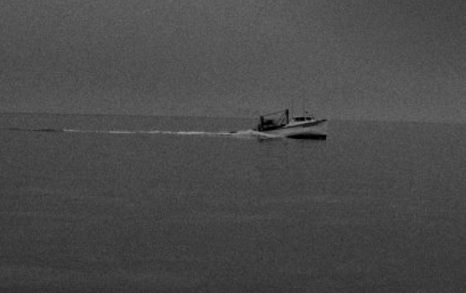
The Incredible True Story of the Henrietta C.
That Monday opened with winds coming steady out of the east-northeast at 20 to 25, or kyowking, as they say on Virginia’s Tangier Island. It’s one of many old and strange words used by the people there: kyowking, or blowing hard. A day unfit for pleasure craft and weekend sailors. But April 24, 2017, was also a workday, and for 72 of the island’s watermen, that meant venturing out into the Chesapeake Bay to harvest its famed blue crabs.,, So it was that at five o’clock that blustery morning, Edward Vaughn Charnock and his son, Jason, slacked the lines on Ed’s workboat, the Henrietta C., and chugged west from the harbor in the predawn dark. >click to read<

Commerce Secretary allocates $200 million fishery disaster funding
Today, Secretary of Commerce Wilbur Ross allocated $200 million in disaster funding appropriated by Congress to help fishermen and the businesses and communities that rely upon them to recover and rebuild following hurricanes Harvey, Irma, and Maria in 2017. Funding has also been appropriated and allocated for the disasters that devastated the West Coast and Alaska fishermen from 2014 to 2017. >click to read<10:03

“A Good Diehl for Fishing” – Warren’s Senate Republican challenger Diehl unveils plan to help fleet
Geoff Diehl, the Republican challenger to incumbent U. S. Sen. Elizabeth Warren, would retain Carlos Rafael’s forfeited groundfish permits in New Bedford and would push to repeal the creation of the Northeast Canyons and Seamounts National Marine Monument, according to his plan to help the fishing industry. Diehl, a state representative from Whitman, is set to release the plan, “A Good Diehl for Fishing,” at campaign stops Thursday in New Bedford, Scituate and Gloucester.,, The Diehl fishing plan also calls for reducing the regulatory burden on commercial fishermen and finding “a balance between the necessary protections to ensure ocean preservation, and continuing to support the growth of a healthy marine industry across the state.” >click to read<09:14
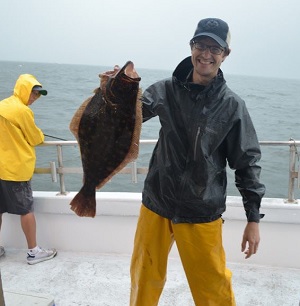
Climate change moving fish north, threatening turf wars, study says
World conflict is likely to increase over access to fisheries, as species move north in response to a warming ocean, according to a Rutgers University study published last week in the journal Science. “Seventy or more countries will likely have to start sharing with their neighbors” in coming decades, said lead author Malin Pinsky, including the U.S., Canada and Mexico.,, Gregory DiDomenico, executive director of the Garden State Seafood Association, said northern states such as New York argue they should now get a larger allotment for their fishing industries. He said allotments, which are set by the Atlantic States Marine Fisheries Commission and the Mid-Atlantic Fishery Management Council, are based on the history of landings by state. >click to read<23:32
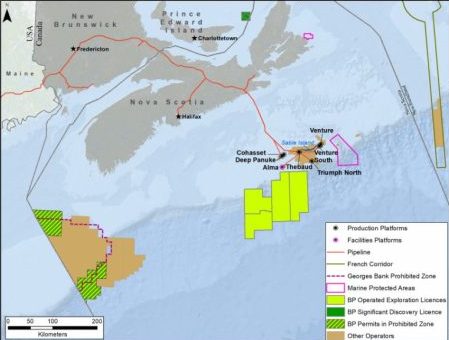
How a small town in Nova Scotia is taking a stand against deepwater drilling in the Atlantic
Less than 100 kilometers down the coast from Halifax sits the picturesque, historic fishing town of Lunenburg. Lining the streets is a kaleidoscope of colourful buildings which lead to the town hall, a red brick building in “old town.” Inside, a quiet rebellion is brewing. Lunenburg town council has decided to take a stand after the recent government approval of British Petroleum’s deepwater drilling project 300 kilometres off the Nova Scotia coast. In April, the oil giant began drilling the first of seven planned exploratory wells, some twice the depth of the Deepwater Horizon well, l, site of the largest marine oil spill in history in 2010. The explosion and sinking of the Transocean oil rig ravaged the Gulf of Mexico, leaking about 3.19 million barrels of oil from BP’s pipes into the ocean over 87 consecutive days.>click to read<19:53

Trump administration replaces Obama-era ocean policy
The Trump administration has revoked an environmental and economic management program for the United States’ coastal ecosystems and replaced it with a program that the president says “streamlines federal coordination.” The National Ocean Policy (NOP), created by an executive order by President Barack Obama in July 2010, established a comprehensive program to ensure the sustainability of the country’s coastal areas and the health of oceans and the Great Lakes. According to a White House news release issued Tuesday, President Donald Trump’s repeal of the 2010 executive order was done because of “excessive bureaucracy created by the previous administration,” citing the National Ocean Council’s 27 departments and agencies. >click to read<17:17
From the White House – Executive Order Regarding the Ocean Policy to Advance the Economic, Security, and Environmental Interests of the United States – >click to read<






